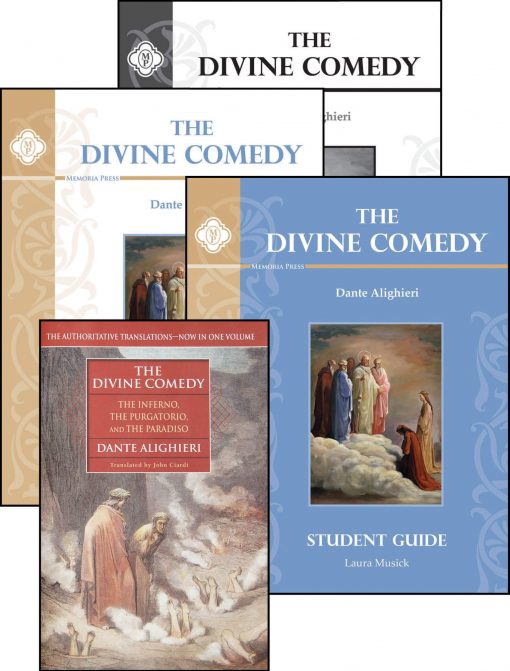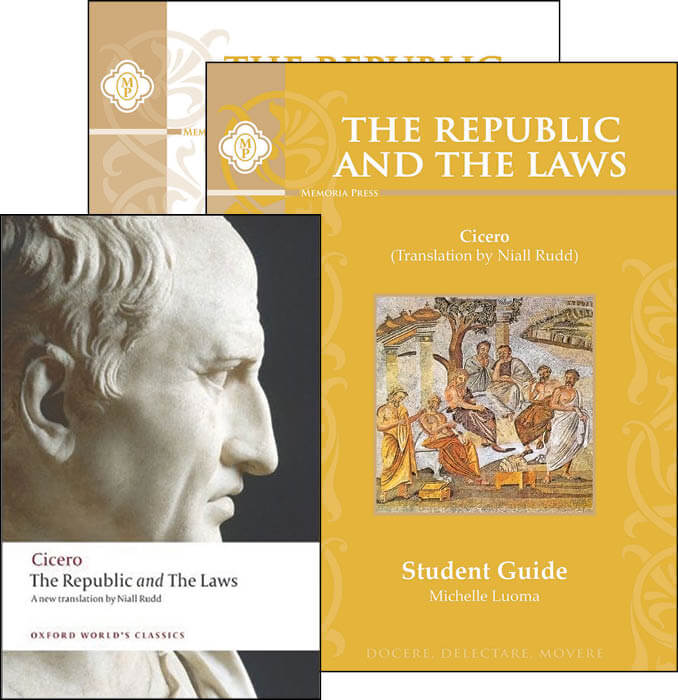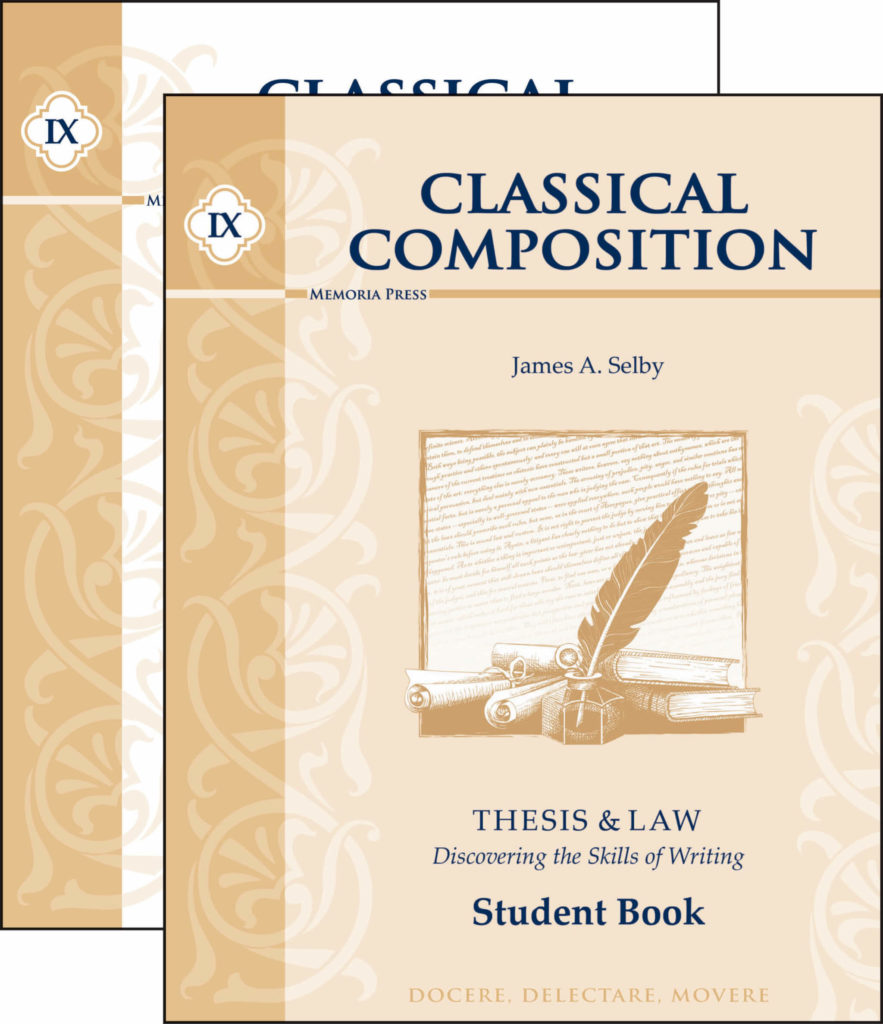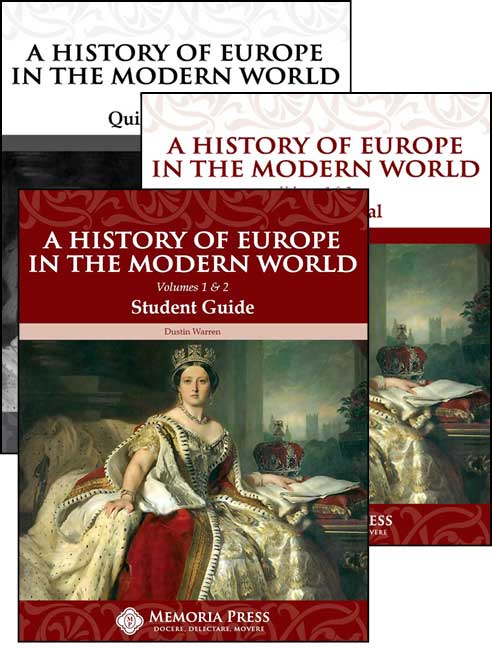Literature

If the classical literature of the West has its foundations laid by Homer and Virgil, then on top of it is a great cathedral. And Dante Alighieri’s Divine Comedy is that Great Cathedral. One of the crown jewels of both Western and Christian literature, the Comedy is an epic, allegorical poem accounting Dante’s spiritual journey of redemption that takes him through the pit of Hell (the Inferno) to the Beatific Vision of God (the Paradiso).
The Comedy is essential to any classical curriculum, because it is the glorious joining of two traditions, both Christian and classical. This is a great book meant to be read for a lifetime.
I recommend the:
- The Divine Comedy text, translated by John Ciardi;
- a Student Guide (has helpful study questions + reading notes for difficult lines)
- for mastery helps use Quizzes & Tests
- and the thing I love the most–a Teacher Guide with drills, background information, discussion helps, teacher notes (and includes an answer key to the Student Guide + Quizzes & Tests)
Note: The above referenced study guides are designed to be read with the John Ciardi translation of The Divine Comedy.
Latin
Henle III will engage students with translations of Cicero. But if your student is new to latin they should not begin here. Check out my article on latin placement and scroll to the end to find the chart on latin placement for older children.
Classical Studies

The Republic and the Laws by Cicero
Marcus Tullius Cicero, a Roman statesman from the first century B.C., was convinced that the upright moral life was the happier life. The Republic became the blueprint of the U.S. government almost 2,000 years after it was written. In The Laws, Cicero defends his understanding of the upright moral life and becomes the foundation for the West’s philosophical discussion on the natural law. Studying such perennial works is a boon to everyone.
Cicero’s dialogue The Republic was written just before the civil war that ended the Roman Republic. Drawing on Greek political theory, it embodies the mature reflections of a Roman ex-consul on the nature of political organization, on justice in society, and on the qualities needed in a statesman. Its sequel, The Laws, expounds the influential doctrine of Natural Law, which applies to all mankind, setting out an ideal code for a reformed Roman Republic, already half in the realm of Utopia.
from the publisher
This is the best complete English translation of both books for over sixty years
Math
Pre-calculus
Choose any Pre-calculus curriculum you like:
Math U See (my current favorite. My kids are developing real mastery in their levels and really liking it. Math is fun when you are good at it! My oldest has declared math to be her “favorite subject” and I credit that much with this curriculum.
Video Text – the set is called “Geometry” and includes Geometry (including Trigonometry), Pre-Calculus, and Calculus. They do sell the sets broken in pieces (for individual subjects) but likely best used altogether in continuation.
Classical Composition
In the final stages of the Classical Composition program, the Thesis and Law stages hone reasoning skills through the introduction of counterpoint and resolution. This provides the students with a plethora of opportunities to create arguments (Invention) using the Heads of Purpose, and to demonstrate them using the Heads of Development. Students will practice:
- Skills of argumentation
- Prepare for the advanced skills of rhetoric
- Gain ability to write “qualifying” essays for college entrance exams
Note: If your child has never done classical composition it is recommended they start at Fable and move through at an accelerated pace until they get to this level, level IX. Take a look at this Classical Composition Sequence Chart to get an idea of how the progression should go at this level.

Science
Choose a Physics curriculum you like, suggestions:
Exploring Creation with Physics – Dr. Jay L. Wile – An excellent textbook put out by Apologia textbooks. It is a college-prep physics course is designed for the student who has completed Algebra 1 and Geometry and has had an introduction to the definitions of sine, cosine, and tangent.
Dr. Wile writes in a very conversational type of manner so it is easy to read. As with all the Apologia texts they defend creation and teach apologetics.
Modern Studies
A History of Europe in the Modern World
This covers the history of Europe from 4000 B.C. to the 1980’s and the fall of the Soviet Union.

